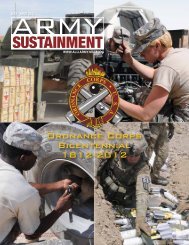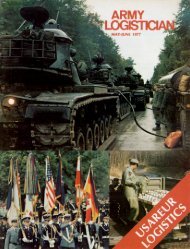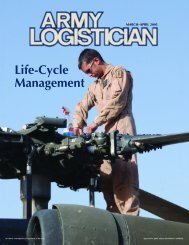Do Stryker Brigade Combat Teams Need Forward Support ...
Do Stryker Brigade Combat Teams Need Forward Support ...
Do Stryker Brigade Combat Teams Need Forward Support ...
Create successful ePaper yourself
Turn your PDF publications into a flip-book with our unique Google optimized e-Paper software.
Commentary<br />
Fostering Iraqi Army<br />
Logistics Success<br />
The news today is full of stories about Iraq.<br />
Inevitably, those stories generate a great deal of<br />
frustration here in the United States and within<br />
the Army. As the Nation sails through its fifth year in<br />
Iraq, many people wonder: Why can’t that problem<br />
just get fixed?<br />
The Iraqi Army has been stood up. Many people<br />
question why the United States cannot just pull up<br />
stakes and leave Iraq for the Iraqis now that they have<br />
an army. I contend that part of the reason why this has<br />
not happened is the Iraqi Army’s difficulty with mastering<br />
the field of logistics. I say this because I saw<br />
that problem up close as a member of a military transition<br />
team (MiTT) in Iraq, advising the Iraqi Army’s 4th<br />
Motor Transport Regiment (MTR).<br />
The MTR is now one of the few field logistics units<br />
within the Iraqi Army. An MTR has four truck companies<br />
and one security, or military police, company.<br />
The main trucks the unit is equipped with are U.S.<br />
5-ton and Russian 8-ton trucks. The security company<br />
is equipped with U.S. high-mobility multipurpose<br />
wheeled vehicles (HMMWVs). The regiment normally<br />
is commanded by a colonel.<br />
Iraqi Army Growth<br />
A lot has happened in the Iraqi Army in a very short<br />
period. The Iraqi government has only gained control<br />
of most of its army in the past couple of years. The<br />
Ministry of Defense in Baghdad now runs everything<br />
connected to Iraqi Army units.<br />
With each passing day, the Iraqis are running more<br />
of the show. However, more work must be done to<br />
stand up the Iraqi Army fully because it is still heavily<br />
dependent on the United States for logistics. It is<br />
important, however, to view this situation in the context<br />
of Iraq, not the United States.<br />
The “low-hanging fruit” analogy clearly applies to<br />
the Iraqi Army. You could think of the low-hanging<br />
fruit as the initial work of putting the army together.<br />
This includes tasks like purchasing and fielding<br />
equipment, recruiting and training the initial cohort of<br />
16<br />
by Lieutenant co L o n e L th o M a S M. MaGee, uSar<br />
The Iraqi Army has made great progress in its efforts to organize<br />
and become self-sustaining over the past 2 years. Now its greatest challenge<br />
is to develop a logistics program that will support an independent force.<br />
This article expresses the views of the author, not the Department of Defense or any of its agencies.<br />
soldiers, and purchasing other equipment. Those tasks<br />
are low-hanging fruit because they are finite, short<br />
term, and tangible.<br />
Just like in an orchard, the next wave of work is getting<br />
the fruit that sits higher on the tree or, for whatever<br />
reason, is harder to reach. Now coalition forces must<br />
help the Iraqi Army through the next phase. The tasks<br />
in this next phase will be more difficult because they<br />
involve nontangible tasks, such as applying knowledge<br />
or integrating complex activities across a broad spectrum—something<br />
the entire Iraqi culture is struggling<br />
with. I think these tasks will require more work because<br />
insurgent groups are fighting to stop those very things.<br />
Logistics is part of that hard-to-reach high-hanging<br />
fruit. To have an effective logistics program, an army<br />
needs both the hardware and the software for the program.<br />
Software, here, is the knowledge to make the<br />
logistics program run effectively. Logistics must be<br />
mastered in order to stand up the Iraqi Army and send<br />
the U.S. troops home. The dilemma the U.S. Army<br />
faces now in Iraq is how to help the Iraqi Army advance<br />
to the next stage.<br />
Iraqi Army Logistics<br />
To address what needs to be done next, it is important<br />
to review where the Iraqi Army is now. The initial<br />
work has been done. The Iraqi Army is fielded, so to<br />
say. They have 10 field divisions, with another division<br />
to come. These new divisions have anywhere from<br />
three to five brigades apiece. Most of these units are<br />
equipped along the lines of light infantry. The soldiers<br />
in these units have completed 5-week basic training<br />
programs at various posts throughout Iraq. This<br />
training is a “one size fits all” kind of training. They<br />
have no specialized training. The challenge comes in<br />
helping the Iraqis master planning, logistics, and other<br />
complexities connected to running those units.<br />
Right now, the Iraqi Army has a unique supply system.<br />
At face value, it looks like a system set up for<br />
peacetime. It certainly is not set up for rapid movement<br />
in the field. Units draw their supplies from a garrison<br />
JULY–AUGUST 2008







